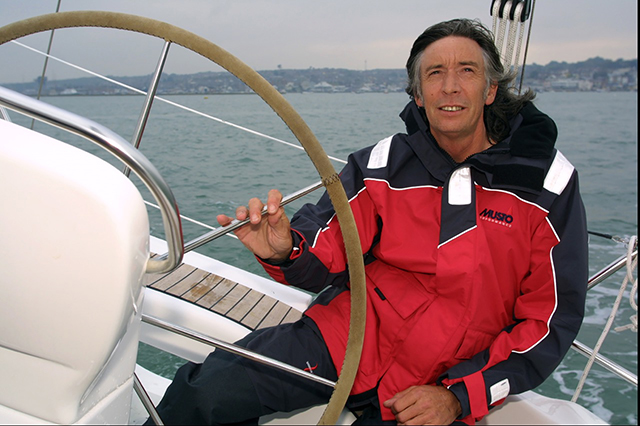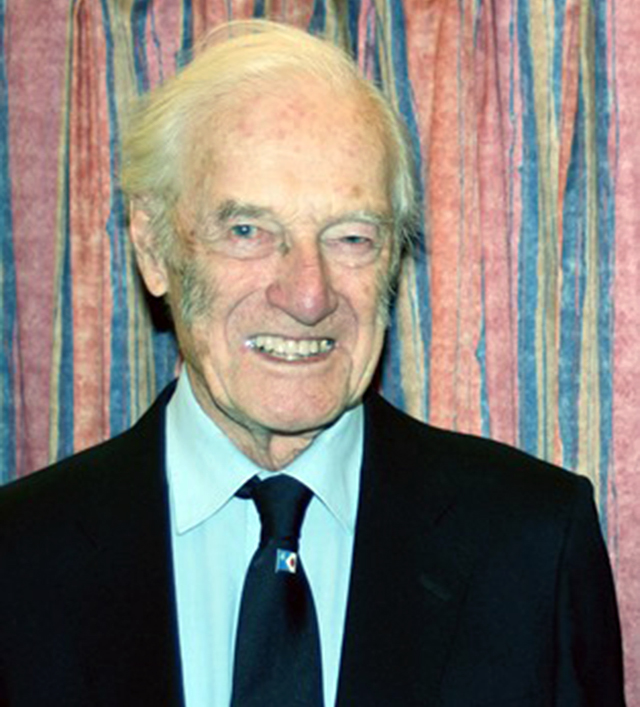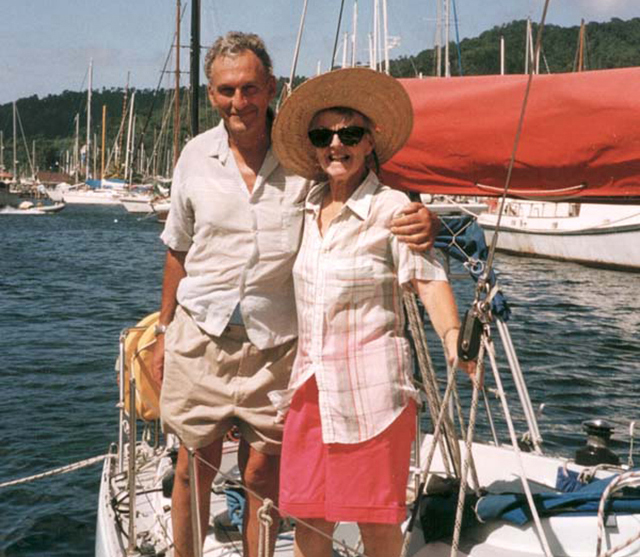Award-winning yachting cartoonist Mike Peyton has died at the age of 96.
The talented artist and keen sailor, who was one of the founder members of the Old Gaffers Association (OGA), passed away late on Wednesday 25 January just five days after his birthday.
The Yachting Journalists Association (YJA) paid this tribute to the “Picasso of Sailing”:
A modest, shy man, he eschewed the spotlight and seemed unaware of the esteem which in sailors all around the world held him.
Born into a mining family in County Durham in 1921, he lied about his age to join the Army and was seconded to draw maps of the North African desert by the Intelligence Corps during the Second World War. Despite escaping twice, he spent most of the war in a prisoner of war camp.
Mike began sketching as a boy, inspired by the graphics in 1930s British comics. After the war he went to Manchester Art School. He also discovered boating. He bought a 12ft canvas sailing canoe from a man in a pub and worked his way down the River Thames, sleeping on moored barges. He even persuaded his girlfriend to elope for a honeymoon in a canoe. Kathleen, his widow, recalls her ‘essential’ wedding presents included a sleeping bag and walking boots.
Soon sailing became a passion as he learned about tides and how to reef sails. His first proper boat was called Vagrant ‘because she had no visible means of support.’ In those days sailors wore peaked caps and ensigns were lowered at sunset. Naturally, Mike felt impelled to stick a pin in the balloon of pomposity of snooty sailors. He worked as a freelance cartoonist for New Scientist magazine for 35 years, as well as contributing cartoons to a wide range of magazines, from Yachting Monthly and Practical Boat Owner to the Church of England Times and Corsetry & Underwear. His cartoons, which often needed no translation, were published worldwide in yachting magazines from Japan to America.

One of Mike Peyton’s favourite cartoons from his Winter sailing collection
With a few squiggly lines from his pen he took people to the heart and soul of sailing and sailing’s cock-ups. He was a unique commentator on the sailing scene for more than 60 years. There was no other sailing cartoonist in the world to match his elegant, economical wit and wisdom. He said he got his best ideas sitting in the bath.
His humour was gentle, rather than vulgar, brash or cruel. As well as a superb draughtsman, he had a winning way with words, whether it was a clever punchline, a headline or a caption. He was a great storyteller – as anyone who sat beside the glowing coal stove on his boats can testify.
At the age of 90, failing eyesight meant Mike had to sell his last boat and stop drawing cartoons. He had owned 13 boats and it became a standing joke that following his ferro-cement boats called Loadstone, Brimstone and Touchstone his next would be named be Tombstone!
He suffered macular degeneration, in which central vision is lost. For more than 30 years he drew the illustrations for Yachting Monthly’s famous ‘Confessional’ in which readers confessed their sailing sins and received an original Peyton cartoon for the best story.
Peyton had 18 books of yachting cartoons published. He also published ‘An Average War: Eighth Army to Red Army’ about his Second World War experiences, reviewed in the Spectator as ‘a brilliant memoir’.
Last year, the YJA presented him with a Lifetime Achievement award and dubbed him ‘the Picasso of sailing.’ In 2011 The Royal Cruising Club awarded him a Medal for Services to Cruising in 2011 for ‘encouraging others to pick themselves up from near disaster and learn from their mistakes.’
Round-the-world sailor Sir Robin Knox-Johnston said: ‘Mike Peyton has been my favourite yachting cartoonist for decades. He has the knack of catching a situation we dread and then poking fun at the reaction.’
Mike Peyton who lived near North Fambridge in Essex is survived by his wife Kathleen and daughters Hilary and Veronica.
Yachting Journalist Association‘s honorary secretary Mike Ford said on the group’s Facebook page: ‘Sad news today. Celebrated yachting cartoonist, Mike Peyton known as the “Picasso of Sailing,” passed away last night, at the age of 96. He had been ill for quite a few days.
‘Almost exactly a year ago he received the Diamond Jubilee Special Lifetime Achievement Award from the Yachting Journalists’ Association.
‘“I am so glad he lived to receive it,” said Paul Gelder, YJA past chairman, and retired editor Yachting Monthly.’
Paul Gelder added: ‘One of the great pleasures of working at Yachting Monthly was dealing with Mike – I edited the Confessions pages for 22 years, from the time I joined as features editor, in 1990, right through to my retirement. We published two books of readers’ Confessions with Mike’s illustrations. Dick Durham wrote his biography.’
Sue Lewis, from the OGA, said: ‘The OGA has lost a great friend in Mike Peyton. Not only was he a founding member of our association in 1963 but he has been a staunch supporter ever since, participating in our events afloat and ashore until only recently.
‘The association conferred its greatest honour on Mike, that of “Elder Gaffer”, and whilst proud of this Mike did not desist from poking fun at gaffers and sailors of old and classic boats, along with all yachtsmen, in his own inimitable style.
‘Mike was very conscious that he was a survivor – that he had survived a war while friends had perished and been lucky enough to escape, rather too closely, a sailing tragedy that had befallen others. Concerned that they might be forgotten he recently donated a fine trophy to the East Coast OGA in memory of his friends lost many years ago on the gaffer “Snipe“.
‘Mike was delighted only just over a year ago to host his own “wake”, gathering friends and family around him at his home in Essex for a fine celebration. Mike had long stopped drawing his famous cartoons due to his failing eyesight but was a great raconteur and we will miss his dry wit, delivered in the broad Durham accent he had managed to retain.
‘I suppose we all rather hoped he’d hold another wake for himself the next year but it looks as though we’ll have to manage that task without him.’
PBO editor David Pugh said: ‘Mike set the standard for marine cartoonists.
‘His insights into the good and bad of sailing were consistently witty and to the point. He’s a hard act to follow.
‘He’ll be sadly missed.’
Former PBO deputy editor Dick Everitt paid tribute to the illustrator, saying: ‘Mike Peyton’s wickedly funny cartoons have enriched PBO for over 40 years, and portrayed the side of sailing that many of us would rather forget.
‘He was a great sailor who died at 96, but also lived life to the full. During WW2 he survived fighting in North Africa, incarceration in a prison camp where 10 men starved to death a week, and was even driven to eating a vicious guard dog. Eventually he escaped and ended up fighting with the Russians.
‘After all these horrors, he needed to roam free, and had loads of sailing adventures that gave him the material for his clever cartoons. Dick Durham’s book Peyton: The World’s Greatest Yachting Cartoonist sums up his sailing life. And Mike’s book An Average War: Eighth Army to Red Army covers the war years.’
Here we look back at an article by Mike Peyton, from the March 2011 issue of PBO…
Snug-as-a-bug winter sailing
The cosiness of the cabin, the kettle on the coal stove and the friendly hiss of the Tilley lamps – Mike Peyton extols the joys of winter sailing

Winter Wonderland. Credit: Mike Peyton
The obvious drawback of winter sailing is the winter bit.
But as one who has been hooked on it for years, there are definite advantages.
In combating the cold we’re spoiled for choice. There are a number of cabin heaters available but, being old fashioned, I am a sucker for a coal stove: seeing the sparks flying away into the winter night tells you – the frozen helmsman – that there’s warmth below when the watch is over, and it’s good to know the kettle is simmering on top of the stove, always ready for a brew.
I’ve handed many a slice of hot buttered toast, made simply by dropping the slice of bread on top of the stove, over the washboards to be taken by chilly fingers – and been the recipient. Few heaters, other than solid-fuel, let you make toast, but their greatest attraction is what has been written about so often – ‘the warm glow of the cabin stove’.
I doubt there’s anything that gets over the feeling of snug cosiness as much the cabin of a small boat, with ample chain, out in a sheltered anchorage.
A cold winter wind may be whining outside, but the coal stove is belting out the BTUs to the point that you’re down to wearing only your thermals.
The wee small hours
When you wake up in the small hours (‘answering the call of nature’ is the phrase that describes it) I always feel that the carpet warm to the bare feet, at least in the vicinity of the stove, is a very pleasant and unexpected bonus.
I can give you a double-edged tip in this respect. On my boat I have two heavy curtains, actually old blankets, one at each end of the saloon. One blanks off the doghouse, the other the forepeak. They are there to keep the heat where it belongs, in the saloon.
The tip is double-edged because once you pull the for’ard one aside to attend to this call of nature it’s like stepping into an ice box.
There are drawbacks to a solid fuel stove, of course, but to me the advantages easily outweigh these. I’m quite happy to put up with lugging coal on board and getting rid of the ash.
Another disadvantage came to light one Easter when I sailed in company with another boat to Ostende. It wasn’t a winter trip, as such,
but it was a cold one. It was the skipper of the other boat who told me of the drawback: I had to keep to lee of him on the return passage,
as he was fed up with getting whiffs of smoke from us which told him we were going below to get warmth and comfort that he, with no stove fitted, could not.
One problem with winter sailing showed itself when, after arriving late for the tide because of the wintry road conditions, and slithering
about the icy deck casting off mooring lines that were frozen stiff, we found our water pipes were also frozen.
Seawater heated on the trusty coal stove solved that problem, however.
Dense winter fog is another unexpected drawback. I vividly remember one nail-biting trip when, in pre-GPS days and with a drying berth to find and the tide away, we tried to ‘hurry slowly’. Another memorable winter weekend happened when we sailed into Pyfleet, a
well-used traditional East Coast anchorage. The dim winter’s day was just drawing to a close and there was no other yacht to be seen but the creek was not unoccupied.

The narrow stove chimney vents fumes and the odd spark above deck, keeping things sweet in the cosy cabin
As we sailed in we set up thousands of geese that had settled down there for the night. I felt I should have been apologising as they took off from the water in alarm and their honking faded away into the night.
It was an unexpected, magnificent and truly memorable sight.
Evening entertainment
The disadvantage of short days must be looked at in a positive manner: they’re a necessary adjunct to long nights, spent in one of the cosiest environments possible – a capsule of comfort in an inclement world.
How we (I say ‘we’ because I generally have a congenial companion) pass these long evenings varies but first you must ensure that there are no potential tapping halyards that are not frapped.
Good ground tackle I take for granted, riding light fixed even if it’s odds-on no one will see it, squeaking tillers and rigid dinghies silenced.
We invariably make a leisurely start by preparing a meal and then eat it in a leisurely fashion – and as we are not sailing we can have a bottle of wine with it too.
We trawl the radio for talks or music and there are plenty of books on board. We even tried chess for a short time. But our favourite pastime is the Daily Telegraph crossword. It might have been designed for our IQ. We can generally solve the easy one over the weekend and have even finished the difficult one once or twice over the years.
We do all this by the light of a couple of Tilley lamps – they save the batteries, give a brighter light (besides the heat) and we like the friendly hissing noise they make.
We turn in early and, unless there is a tide to catch, we sleep late.
Dogger, Fisher…
What to make of the shipping forecast is the only thing that needs a seaman-like decision from the winter-sailing yachtsman. In my case it’s often a joint decision, as the person I normally sail with has boat on another river on which we sail alternately – an arrangement I recommend, if you can manage it, as it gives a change in cruising areas. (Both boats, I may add, have solid fuel stoves on board.)
If gales are forecast for your area, take your other half out to dinner and get some Brownie points in.
Gales, however, do not blow every weekend in winter. And even if they do, assuming you have a well-found boat, simply stay in local sheltered waters and have a bolt-hole to run to – winter sailing is good practice.
Nevertheless, do not forget that there is more weight, ie moisture, in winter winds than in summer ones. And it is the shipping forecast you must listen to, not the normal weather forecast.
I remember running down the coast, one winter weekend, with the tide under us and a fair offshore breeze. It was everything a yachtsman could ask for and we were at peace with world. What heightened the pleasure was the radio telling us that, because of icy roads and heavy snowfalls, the country had been brought to a standstill.
We looked at the snow-covered coast with smug satisfaction… until the boat was back in its berth and we were scraping ice off our car windscreens.
To find more archived articles by Mike Peyton browse the PBO Copy Service.
A tribute to Steve Sleight: author, broadcaster, sailor and boat builder
Steve Sleight was an author, broadcaster, sailor and boat builder with an infectious enthusiasm and a passion for the very…
Tributes paid to popular East Coast sailor Colin Jarman
Cruising community remembers the inspiration behind East Coast Pilot
Tributes to Paul Elvstrom: “The Mozart of sailing”
"You haven't won the race, if in winning the race you have lost the respect of your competitors." Legendary sailor…
Pat Manley tribute
Pat Manley, a long-time contributor to PBO and who regularly featured in our Ask the Experts pages, passed away on…
Tributes paid to Clipper Race casualty Sarah Young
Clipper Race teams united across the Pacific Ocean with a minute’s silence and ceremonies to pay their respects to Sarah…
Tributes pour in for yacht designer Ed Dubois
From Westerlys to superyachts, with plenty in between, the career of designer Ed Dubois has been spectacular.
Tribute to the Cruising Association Almanac editor
The Cruising Association is sad to announce that Tony Brett-Jones, a past President of the CA and, for many years,…
Tribute to RYA knot expert Gordon Perry
Gordon Perry, co-author of the RYA Knots, Splices & Ropework Handbook, sadly passed away over the Christmas period.
Tribute to Admiral Mary Barton
The Ocean Cruising Club (OCC) has paid tribute to its former Commodore, Admiral Mary Barton, who died on 1 December,…
Tributes paid to yacht designer Mike Pocock
Tributes paid to Mike Pocock, long-distance cruiser, yacht designer, and former OCC Commodore, who has passed away.
Tributes paid to ‘Dallas of the Seas’ star Kate O’Mara
The Howards' Way actress Kate O'Mara has passed away at the age of 74
Tributes paid to tragic yachtsman Roger Pratt
Condolences paid to Margaret Pratt after her husband is killed after robbers boarded their yacht in the Caribbean
Tribute to Hunter Boats co-founder Warren Luhrs
The 69-year-old died suddenly of a heart attack last month
Tribute to the founder of the Freeman cruiser
John Freeman passed away two days before his 96th birthday
Tributes pour in for Andrew Simpson following America’s Cup training tragedy
The Olympic gold and silver medallist has died at the age of 36
Tributes paid to popular yachting journalist
Mike Balmforth is praised for giving a 'lifetime of dedication to the marine industry'



















